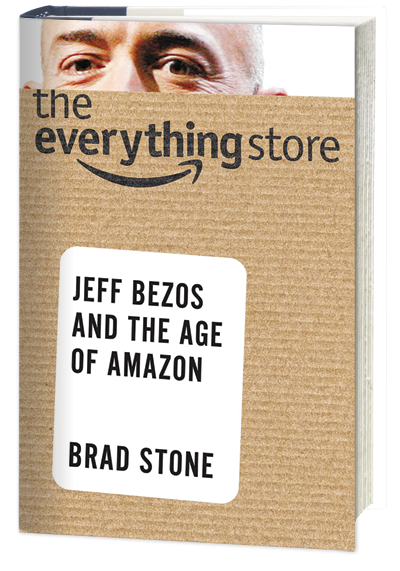I’ve just finished “The Everything Store: Jeff Bezos and the Age of Amazon” and wanted to share a few thoughts about this amazing book. A bit like Steve Jobs’s biography, you feel like walking alongside Amazon’s founder and get to know more how he works.

Actually, the whole substance of the book is summarized right from the beginning by this quote from Jeff Bezos himself: “We are genuinely customer-centric, we are genuinely long-term oriented and we genuinely like to invent”. The next 300 hundred pages just make this statement reality:
- Amazon is a frugal company, with no perks ever for employees, no seats in business class, no free parking, not even other desks than the notorious “door desks”. When Amazon begin its growth, the pression is higher for providers and suppliers, but all, ALL is given back to the customer with the concept – taken from Walmart – of “everyday low prices”. Amazon didn’t know any profit for quite a umber of years, but instead, their market power has been only increasing.
- Jeff Bezos thinks on a scale of decades, not years, and not even months or weeks. Thanks a few investments (early investor in Google) and a majority stake in Amazon, he’s able to overturn a quite conservative board. He puts money for long developments (3y+ for the Kindle, for instance), tries a lot of things, and goes through both the dotcom burst and the financial crisis of the late 2000s with pain, but consistence.
- Last but not least, it’s crazy to see at which point Bezos himself is challenging everything, from top executives to customer service or potential partners, investors. Nothing is taken for granted, all is open to debate, and with a character not far from Steve Jobs’, innovation is permanent, with highly risked bets, such as opening new categories on Amazon (toys, music, apparel…) to Amazon Web Services, the Kindle, and, who knows, grocery, hardware and other stunts.
The book also shows
- how e-commerce is redefining retail, notably through data and the possibility of a personalized relationship with each customer or visitor (customized suggestions from the algorithm based on what you bought, searched, liked)
- why platform strategies work so well with technology companies. Once they have built an infrastructure, they can leverage it by allowing other parties to use it… at a price (30% cut on Apple Store, pressure on prices and competition on Amazon, etc)
- how Amazon strategically played in the low-margin field, asserting that companies which aims high margins such as Apple attracts too much attention from competitors (Samsung in the case of smartphones). Low-margins with huge market size makes pressures and negotiations more easy for Amazon. Big players like Google, IBM or Apple would think twice to compete against Amazon from their high-margin point of view.
- the way communication is completely associated with a malfunction of the organization. For Amazon, the ideal are a collection of creative, autonomous teams (known as “two pizza teams” because two pizzas are enough to feed them for an all-nighter), which work closely on a topic. When communication is needed, it just adds layers of management and makes decision and innovation less likely. The counter-example is of course Microsoft and its army of managers.
- the power of the crowds, when Amazon puts reviews online for every seller of each product, and it disrupts the old “gatekeepers”, in particular in the book industry. Until then, editors had a high hand on what would be published, price-wise as well as content-wise. Amazon changes it all and reviews are a key part of the sale potential for each object.
I highly recommend reading this book, and would also recommend making a combo with Steve Jobs biography to be able to compare how these two great minds just don’t give a sh*t about what other people think and how their stubbornness is one factor which make their companies successful.